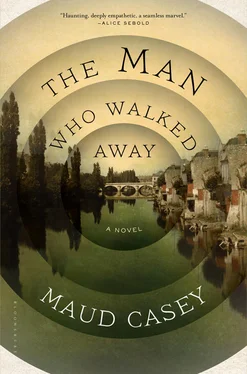The Doctor’s leg has gone numb from the cold stone and he stands to shake it, then brushes the dirt from the seat of his pants. “Not there,” a voice beyond the walls of the asylum cries. “No, here. Here. ” There are deliveries not far from the asylum gates at this hour. Something thuds against the cobblestones and two men curse at once. Otherwise, the noise of regular life in the city is faint. He barely hears it when he is here; the patients aren’t the only ones who find protection from the noise of life in here. In his pocket, his father’s watch ticks into his palm. He never knew the precise moment of his father’s death and it has always bothered him. The hands of the watch moving so fluently through the minutes: Was this it? The hour of his father’s death? Was this? But the hands never stopped to tell him. Tick. Now? Tick. Now? Tick.
“Oh, for God’s sake, where are you now?” A woman’s voice rises up out of the murmur on the other side of the wall.
Where am I? the Doctor’s father asked, batting away the incompetent doctor’s flapping cuffs. You are right here , said the incompetent doctor, in a rare moment of competence, and his father became still again. The only sound was the leeches doing their work. You are right here . On the mat on the floor beside the bed where he slept each night, the boy Doctor listened to the ticking of his father’s watch until they both fell asleep.
Mother, I am frightened. There isn’t time for this, for everyone’s unhappy story all at once, and so the Doctor heads back inside to focus on just the one, heading toward the new patient’s room. The man does not remember arriving; he does not remember leaving. He is an exception to the generations born after the last humiliating war, the Doctor thinks; the trauma suffered by the mothers of the French Revolution and the First Empire has resulted in generations that were born tired, but this man may be something altogether different.
When he walks in to the room, the man whose name is Albert is sitting with his back to the door, looking out the window at the park in front of the Palace of Justice. He appears to be listening to something. Did he hear the fierce statues on top of the palace who glared at the Doctor: And? So? He is dressed in fresh clothes, but his long, callused feet are bare. They are huge , these feet that have traveled — if the man’s story is true — all over Europe. They are as big as the feet of the Doctor’s father. One summer, he studied those feet as they walked along the beach. The footprints in the sand were twice the size of his boy feet. His mother showed him how she could fit her hand three times in just one print. As the three of them walked, the moment seemed as though it would last forever, and it has, hasn’t it?
The man’s slumped shoulders shake slightly. At first he appears to be laughing, but when he turns from the window he is not laughing at all. He coughs, choking on tears that come too fast. Leaning forward, he spits up a tumbler’s worth of vermilion blood into his hands.
“Oh, dear,” he says.
The Doctor is relieved to be given something to do.
“Here.” He offers the man his arm, helps him to his feet. “Here.” He walks him to the bed where he lays him down and applies a plaster to his chest near the top of his right lung and another underneath his shoulder blade. There is no reason to believe he is tubercular, but what does it matter? The answer to the wrong question is still an answer. Not the answer, but an answer. The plaster does its work, drawing blisters, but the man closes his eyes as though he is wrapped in the softest blanket, and when the Doctor gives him the hemostatic mixture of cod-liver oil, he swallows it as if it were a bite of the first ripe peach of summer. He pushes gently on the man’s shoulder, coaxing him to lie back.
“Are you well enough to talk?” the Doctor asks after the man has lain quietly for several minutes.
“Yes,” he says. “Yes.”
“You’ve had a good, long sleep. Exactly what you need.” He puts his hand on the man’s shoulder. And, so, you are better now. These practiced small gestures — the steady, unwavering touch, the certain tone that gives the ethereal if a solid spine: You are.
“I have never slept so well,” the man says, his eyes still closed, holding himself stiff and still.
“So perhaps I may ask you a few questions?”
“I will do my best to discover the answers.”
“How old are you?”
“I am not sure,” he says. “Inquiries could be made.”
The ghostly murmurs of the other patients drift down the hall. Beethoven’s Sonata No. 8 in C minor finds them too, fitful, melancholy, then finding its way, full, and urgent. Rachel and her frog have decided to give death a break for now.
“There is no need for inquiries,” the Doctor says. “I would guess your age is twenty .”
“What a useful thing, to know one’s age,” the man says, as if the Doctor has restored his whole life. “I am delighted to know that. Thank you.”
Suddenly the man sits up. “I am not able to say how I got here,” he says. “I am always leaving. I cannot prevent myself from leaving. I go straight ahead, and then I discover myself, not knowing how I got there, far away. I discover myself in this public square and then suddenly I am in another. I wake up somewhere else entirely.”
“Why do you cry?” the Doctor asks, gently coaxing him to lie down again. “We have only just started.” He hopes to speak to the man just a little longer. It is true what Nurse Anne said. He does not appear to be a vagrant, but he doesn’t appear to be a tourist either. He is not, for example, the man the Doctor met on the train for whom travel is a souvenir, a lovely vase to be lifted from the mantelpiece and admired and then returned. Maybe he would go; maybe he wouldn’t. For this man, it appears travel is a broken shard that has lodged inside of him, causing him not to be so much consumed by an obsession to pursue travel as consumed by travel itself. Travel, from travail , bodily or mental labor or toil of a painful, oppressive nature. From the Old French travail , suffering or trouble. In German, “tearing free.” Travel , from the Latin word for a three-pronged stake.
“Please don’t send me away,” the man says. “I am so tired.”
“We won’t send you away,” the Doctor says, closing the shutters to block out the sun’s glare, as well as that of the statues on the Palace of Justice. “You need to rest. You can rest here.” And? So? He carefully removes the plaster and then covers the man with the sheet. And, so, you are better now .
“The leaves of the trees in the public garden were gold that time,” the man says. “From the gas lamps, I believe.” He props himself up on his elbows, leaning his head against the wall. “I once discovered myself in Aix pitching hay. And once I woke to find myself in Brussels. There was work in a ceruse factory there. There may have been an avalanche. In Andernach.”
“That is very helpful,” the Doctor says. “When were you in Aix, and Brussels, and Andernach?”
The man looks at him miserably and closes his eyes. “I do not want to disappear anymore,” he says.
“You will remember,” the Doctor says. “Your life, it will come back. There is plenty of time to talk.”
“What day is today?”
“Friday.”
“And tomorrow is Saturday?”
“Tomorrow is Saturday,” says the Doctor, taking the man’s hand in his.
In the man’s large eyes, the Doctor sees it again, the same look he recognized when he first saw him in the billiard room. What will happen next ? it says. That invitation. But to where? “I will see you tomorrow,” the Doctor says. “Rest.” He touches the man’s forehead to distract himself from his unsettlement, but the man’s warm forehead sends him back to the Niger where he is once again a teenager on a ship wondering what will become of him, orphaned and alone, so seasick he thinks he will die, looking out over the vast and endless ocean insurmountable as his life.
Читать дальше












